- Administrator
- Albums and Singles
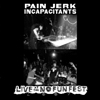 Most people when asked about the distinctly Japanese dialect of what the world knows as noise can easily mention Merzbow. Some of the more well versed can even come up with Masonna. Pain Jerk and the Incapacitants, however, are often reserved for those a bit more "in the know." Both have had long, prolific careers and this disc captures both of their first, and only performances thus far in the US. The sound is every bit as brutal and engrossing on here as it is on either of their multitude of studio works.
Most people when asked about the distinctly Japanese dialect of what the world knows as noise can easily mention Merzbow. Some of the more well versed can even come up with Masonna. Pain Jerk and the Incapacitants, however, are often reserved for those a bit more "in the know." Both have had long, prolific careers and this disc captures both of their first, and only performances thus far in the US. The sound is every bit as brutal and engrossing on here as it is on either of their multitude of studio works.
I must admit to feeling more than just a bit of frustration from this disc. Back in May, I was all set to see the Incapacitants during their first every US show. However, due to an awful (now ex-) girlfriend who was an even worse driver, I missed the show because of an accident and instead had to spend the night in fascinating Poughkeepsie, New York. Not only was that incident annoying enough, but now I look through the photographs in the accompanying booklet and thing "wow, if it wasn't for her, I could perhaps see my ugly mug somewhere in one of these photos!" But, I digress.
Kohei Gomi, a.k.a. Pain Jerk contributes the first performance in "Hello America (Excerpt)," which is 33 minutes of pure phased destruction. Crushing low-end pulses, shrill shards of processed white noise, and everything in between. No moments of quiet introspection or any relent at all to the pummeling. I must admit to finding it a bit disappointing overall when compared to Pain Jerk's studio work. In that context, he has a very unique sound based on very tight, well-controlled loops and almost rhythmic processing; which is something that set Gomi apart from his contemporaries. It might just be a factor of the live versus studio setting, because that element makes only sparse appearances throughout the performance. It is by no means a bad set, but it doesn't stand apart from other noise artists as much as it should.
While looking at the photos Pain Jerk can be seen as the long haired, metal looking guy he is, the Incapacitants provide a stark visual contrast. The band, consisting of Tosiji Mikawa (also of Hijokaidan) and Fumio Kosakai (of C.C.C.C.) are both short haired Japanese salarymen. Mikawa is a bank employee, and Kosakai works in a government office. Hence, their noise work is a pure hobby. Until a DVD (which I hope is forthcoming) is released, take it on my word from previous performances I have seen via video: these two always look like they're having the time of their lives during performances. Hopping around, fists pumping, wrestling with each other and just generally spazzing out is how they roll: Mikawa has said he started the Incapacitants as a way to explore pure noise without any other pretense or framework, and the two seem to be possessed by the spirit of harsh electronics whenever they're on stage.
Their performance, "The Crowd Inched Closer & Closer," begins with the recorded yells from the audience, yelling various album titles the group has released in the ultimate perversion of "the request" at rock shows before a sputtering noise comes in accompanied by one of the two's screams. Then, without a pause, the roar begins. Hypnotic washes of white noise, ray gun sine waves pulsate, and the screams of two men enjoying the moment in the most enthusiastic way possible.
Kudos to everyone involved with recording and mastering this beast, because even through all the expected difficulty in making a noise recording "clean," especially in a live setting, the individual elements come through nicely and various complexities that could be otherwise overlooked are noteworthy.
This is truly the spirit of noise: no macho posturing, no pseudo-intellectualism, no "rocking out," no pretense. Just pure, unadulterated electronic distortion of the highest quality done by two of the masters who have ever turned the knob on a distortion pedal that is fun, terrifying, hypnotic and fascinating all at the same time.
samples:
- Hello America
- The Crowd Inched Closer & Closer (Excerpt 1)
- The Crowd Inched Closer & Closer (Excerpt 2)
Read More
- Administrator
- Albums and Singles
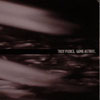 Richie Hawtin has made some excellent though unexpected choices in 2007 with his still-thriving imprint. After implausibly giving newcomer JPLS a magnetic though understated full-length album showcase, the superstar DJ/producer shifts away from that informed unorthodoxy with a relatively risk-free and agreeable extended EP from one of his apparently deserving second-tier acts.
Richie Hawtin has made some excellent though unexpected choices in 2007 with his still-thriving imprint. After implausibly giving newcomer JPLS a magnetic though understated full-length album showcase, the superstar DJ/producer shifts away from that informed unorthodoxy with a relatively risk-free and agreeable extended EP from one of his apparently deserving second-tier acts.
Though Gone Astray marks his first ever CD as a solo artist, Troy Pierce has enjoyed a fair bit of attention through releases with well-received projects such as Louderbach and the decent yet inexplicably hyped Run Stop Restore trio with Magda and Marc Houle. On the surface, he seems a perfectly reasonable and logical fit to get his time on plastic, though with only 8 original tracks out of the 10 provided here, I immediately found myself concerned over whether or not this could live up to the promise and challenge of JPLS' Twilite. Having been written largely while on the road, this incohesive collection of material seems perfectly appropriate for the 2x12" vinyl format, but as a disc it feels forced.
To his credit, Pierce does not hold fast to stoic asceticism in these fit and funky productions, unlike many of his restrained M_nus peers. Opening with "Lost On The Way To DC10 (Berlin)," he precariously tinkers in the fuzzy, quasi-melodic badlands that make minimal techno just about impossible to define. Konrad Black's subsequent remix initially attempts to suppress the excesses of the original, though the textures and tones gurgling under the surface are far too animated to stay beneath the low-pass filters for very long. Rhythms swing freely as well as on comparatively sparer cuts like "Word" and the claustrophobically acidic "Golden." "Go Without Me (Come Back)" is almost nausea-inducing with its oscillating, disoriented waves, while "Finnished" bleats an routinely EBM-esque bassline in the vein of early Nitzer Ebb.
Appearing in two versions, the bleak and bleepy "Even If It's Alone" features the infrequent voice of Louderbach collaborator Gibby Miller. The basic lyrics and dry delivery hemorrhage a druggy desperation, something all too common and rather tiresome on the cold vocal tracks that M_nus and like-minded labels have unleashed in the past couple of years. Ultimately that very familiarity—or rather, that unoriginality—evinces why Gone Astray will hardly move more than the dancefloor, and even then only fleetingly. Pierce's work, though quite satisfactory, finds its home in the comfortable and even prosaic, whereas with JPLS' album, strains of a possible genre evolution tantalized and provoked. Techno devotees will naturally engage with these tracks but, with nothing captivating to cling to or embrace, will likely forget all about them shortly after the disc is done.
samples:
Read More
- Administrator
- Albums and Singles
 Chris Hakius and Al Cisneros invert their formula on their third album. Instead of only creating tension through loudness and distortion, they also generate an uneasy mood through a judicious balance of softness and clarity. Recorded by Steve Albini, Pilgrimage finds them branching out into more delicate yet no less intriguing territory for what may be their most consistent album yet.
Chris Hakius and Al Cisneros invert their formula on their third album. Instead of only creating tension through loudness and distortion, they also generate an uneasy mood through a judicious balance of softness and clarity. Recorded by Steve Albini, Pilgrimage finds them branching out into more delicate yet no less intriguing territory for what may be their most consistent album yet.
On the title track, Cisneros explores the timbral nuances of the bass more than he has on any of their previous albums. Rather than just exploding forward with a fiery crackle, he repeats a quiet melody that highlights the tones of his instrument's untreated strings. His vocals are hushed on this song like his bass, and Hakius' drums, mainly rumbling toms, are mixed accordingly. The production on this song heightens the brooding anticipation, drawing me in and making me curious about what happens next rather content to follow them at will.
One of the other benefits of opening with this contemplative, moody track is that when they do choose to amplify things, it's much more dramatic. The ear-crushing "Unitive Knowledge of the Godhead" rears up like the Om of albums past after a brief echo-laden intro. It is vintage Om, and a welcome haven after the haunting opener. "Bhima's Theme" continues in this vein, although here Cisneros' vocals are more prominent and have a different rhythm than usual. Halfway through the song, the drums disappear, leaving only the bass and vocals for another meditative section before erupting with a cacophonous finale. The fourth and final song is a reprise of the title track, which may be unnecessary since the memory of the first version is still fresh, yet it is a faithful reminder of how things started.
While "On the Mountain at Dawn" from Variations on a Theme remains my favorite song by them, I'm more likely to listen to Pilgrimage from beginning to end than any of their other albums because it has the most variety and depth. Even though the music at times is less visceral than I'm used to from them, I found myself more attentive to the details than usual. The chances they take with their songwriting and the variety of subtle production touches they employ go a long way toward making this a satisfying and rewarding album.
samples:
Read More
- Administrator
- Albums and Singles
 While the album's philosophy is an integral part of its success and woven into the music, and packaging is undoubtedly personal (wax seal, unique piece of photograph as gift), still Tracks is not giving anything personal away with the liners. In terms of vision Everything Judged by Success Alone is about as close as possible to a one man vision of Godspeed You Black Emperor as anyone's likely to be able to conjure up.
While the album's philosophy is an integral part of its success and woven into the music, and packaging is undoubtedly personal (wax seal, unique piece of photograph as gift), still Tracks is not giving anything personal away with the liners. In terms of vision Everything Judged by Success Alone is about as close as possible to a one man vision of Godspeed You Black Emperor as anyone's likely to be able to conjure up.
Creating a minimalist reduction of GYBE's almost-orchestral widescreeners, Tracks manage to create just as internalised a vocabulary through instrumentals and obscure vocal samples. This album's worldview is just as (if not more) bleak than that collective's ideas. The borrowed narrator on "Starts with Cans" starts with a sad sinking story and then plummets into alcoholism, the post-rock strum plays an ideal balance and backing. When near the song's end a sound emerges that could either be guitar work or a passing train horn, the attention is so deep in the narrator's world that there is no way of telling. Much of the album follows this stripped sepia guitar setting, simple patterns with minimal effects and some field recordings keeping everything intimately close at hand.
Feeling like a single lonely ride, "Everything Judged by Success Alone," Tracks slowly begins to flesh out the second half of the LP. The slowly building "B Flat, D Flat, A Flat, C" pushing the meter into the red of eroding emotional control, the song's sharp notes tempering the content from the cold. There is percussive stringplay on "Special Powers," beating a tattoo below sinister samples, the additional elements never infecting the atmosphere. The only time Tracks fails to hit the target is on "Snowstorm into Blood Spattered Sheets" (superb title though) where a traditional band format recording feels imposed. Feeling like a totally different band, the mood is splintered but it is still not enough to even dent this record.
samples:
Read More
- Administrator
- Albums and Singles
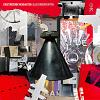 The title of this album translates into "everything open again," especially fitting considering that this band have been going for nigh on three decades and continue to evolve. Many a younger band would be delighted with this as a debut, let alone the 20-oddth studio album of a consistently innovative career, not just musically but also the very means by which a record is made. With Radiohead taking a leaf from their book in terms of cutting out the record label middleman, this album is as much a statement of the healthy state of independent music as it is a fine collection of songs.
The title of this album translates into "everything open again," especially fitting considering that this band have been going for nigh on three decades and continue to evolve. Many a younger band would be delighted with this as a debut, let alone the 20-oddth studio album of a consistently innovative career, not just musically but also the very means by which a record is made. With Radiohead taking a leaf from their book in terms of cutting out the record label middleman, this album is as much a statement of the healthy state of independent music as it is a fine collection of songs.
The fact that Alles Wieder Offen was fully funded by the fans and recorded without any constraints, artistic or otherwise, could have lead to two very different situations: the first being a turgid, self-indulgent mess or the second being a quality work of art done with the full respect for those who have helped and trusted them with their money. Granted Neubauten's track record of exceptional album after exceptional album weighs the odds in their favour but it is always great to hear the final results and confirming that yes indeed, they have spent our investments well. How a similar model would work for a less established artist is unclear (a fan base is undeniably necessary) but it is still a forthright middle finger displayed proudly in the direction of the record industry.
Everything may be open again but not everything is completely new. Like the Kurt Schwitters- esque collage that graces the album's cover, many of the songs take bits and pieces from Neubauten's past and superimposes them on the new material. Musical and lyrical elements from older songs like "Sehnsucht" and "Redukt" make appearances in new guises. Out of the ten songs on Alles Wieder Offen, two will be familiar to anyone who has been following their subscription only releases. The opening track, "Die Wellen," was first released on the piano only album Klaviermusik. Here the vocals and piano are supplemented with a throbbing bass and percussion rhythm, propelling the song on and on until it topples over a precipice and ends suddenly and dramatically.
This is followed by the second familiar song which is also one of the finest songs to come out of Neubauten's bunker since the band's inception. "Nagorny Karabach" was originally performed and recorded at a concert for neubauten.org supporters in Berlin three years ago. Taking the original live take from that night, the band have added some very slight overdubs and Bargeld has finished the lyrics. The finally completed song is beautiful; a tender bass line by Alex Hacke provides a canvas for Bargeld's new and improved lyrics. E-bow guitar and a stripped jet engine played with brushes complete the magical sound.
I could go through the album track by track as each song has enough ideas to it to warrant a paragraph of its own but I will rein myself in. Only one of the songs disappoints: the music to "Ich Hatte ein Wort" sounds a little like something from The Lion King, I cannot help but imagine antelope galloping across the Savannah in time to this song. Aside from that, Alles Wieder Offen is faultless. Those expecting any return to the confrontational Neubauten of old will of course be disappointed, this should be obvious but there still seems to be a core group of people out there who expect the group to revert to their older, wilder style. To those with open ears, it is clear that Neubauten are still as cathartic and evocative as they have always been; "Weil Weil Weil" and "Let's Do it a Dada" are their big 'hits' like "Feurio!" and "Yü Gung" of yesteryear, "Unvollständigkeit" and "Ich Warte" are the sounds of the band looking forward again. As much as I am enjoying this present work, I too continue to look forward to what the future will bring.
samples:
Read More
- Administrator
- Albums and Singles
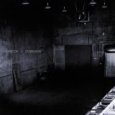 Fernando Corona is back with another Murcof record, and this time he's tackling nothing less than the entire cosmos. In terms of creative process, Murcof leans further away from his previous micro-programmed pieces with Cosmos, and relies more on sounds derived almost entirely from recordings of classical instruments. He has not, however, abandoned the idiosyncratic precision or faith in structure that have served him so well.
Fernando Corona is back with another Murcof record, and this time he's tackling nothing less than the entire cosmos. In terms of creative process, Murcof leans further away from his previous micro-programmed pieces with Cosmos, and relies more on sounds derived almost entirely from recordings of classical instruments. He has not, however, abandoned the idiosyncratic precision or faith in structure that have served him so well.
Leaf
Both "Cielo" and "Cometa" recall the blip-vertiginous swinging rhythms of earlier Murcof tracks like "Memoria" and show just how little is needed to get down with one's bad molecules. If the progressive music show from BBC2, Old Grey Whistle Test, were to be reborn in the year 2525, either piece would be perfect for the opening credits (where the stars took human form and jigged around). Murcof's work usually adheres to an increasing pleasure per play ratio so I fully expect to like Cosmos more than I currently do. For now, though, when listening to some sections of this record, I felt as simultaneously impressed and unengaged as when I went to the rim of the Grand Canyon. Gazing down and wondering when I would be able to articulate my feelings, before realizing that either the ones I briefly held had dissipated like dust in the wind, or that I didn't really have any. (In the end, "Wow, it's really big" is not saying much.)
The pieces "Cosmos I" and "Cosmos II" (which I like to call "Max Richter v. Blade Runner") are appropriately huge, dense edifices. They remind me of spectacular giant glass skyscrapers: places you can admire without wanting to live in (or opposite). Of course, we all do live in the cosmos, it's pretty great, and maybe this recording will make more sense when heard in the planetarium gigs that are mooted. I hope so, because on headphones and in the car, Murcof's portrayal of the cosmos seems pretty uninviting.
By the end of the album I felt as removed from the action as the Squire's under-gardener Percy Cullerne from Adam Thorpe's miraculous novel Ulverton. At the outbreak of the First World War, despite 32 other young men of Ulverton accepting the Squire's bidding to join up and fight, Cullerne declines, simply stating that he would "rather bide at home." The Squire is absolutely livid, Cullurne becomes an outsider (mocked and avoided) but slowly and surely the death notices arrive. In 1923, overcome by guilt, the Squire kills himself. There's no reason for Murcof to be anything other than proud of his work, but, while Cosmos is undeniably impressive, for now I'll "bide at home," thanks.
samples:
Read More
- Administrator
- Albums and Singles
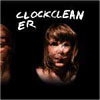 The music industry needs a new genre about as much as it needs another RIAA, but here is one of the self proclaimed torchbearers of "skull music," apparently characterized by garage rock production values and owing as much debt to sludge metal as early 1980s goth rock. So, naturally, it's going to be pretty awesome.
The music industry needs a new genre about as much as it needs another RIAA, but here is one of the self proclaimed torchbearers of "skull music," apparently characterized by garage rock production values and owing as much debt to sludge metal as early 1980s goth rock. So, naturally, it's going to be pretty awesome.
The eight tracks that make up this album can be classified by their length: there are the shorter, more up-tempo tracks, and the slower, more dirgy anthems. The opening "New In Town" is more of the latter: a slow, distorted rhythm not far removed from the early days of Swans with a more post-punk bent, while guitarist/vocalist John Sharkey III simultaneously channels Peter Murphy and Lux Interior with his just slightly over the top, to the point of sarcasm delivery.
The latter comes up even more on the up tempo, shorter songs, with a more punk, less country approach to rockabilly on tracks like "Caliente Queen" and "Daddy Issues," which bounce along somewhat jauntily despite the overall dark, sinister atmosphere of the album. "Vomiting Mirrors" exemplifies this dark feeling, in spite of its bouncy sound and Stooges-style backing, the unpleasant title and lyrics about a "dead doggy on the tracks" keep it firmly grounded in the dark and morose.
The longer, slower tracks focus more on the bass and distortion, capturing the dissonance and, especially in the case of "Human Pigeon," where tribal punk rhythms echo of early Killing Joke (before Jaz went to Iceland and got gothy). These also end up being more anthematic in feel, more spacious arrangements that, I'll probably burst into flames for even mentioning this, have the vestigial traces of early U2 in their vastness.
Above all, Clockcleaner aren't afraid to simply 'rock' without the need of a gimmick or to paint themselves as post-modern ironists. They play loud, sleazy garage rock and occasionally even have guitar solos. They love distortion and making a racket and it is very, very good.
samples:
Read More
- Administrator
- Albums and Singles
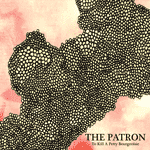 One wouldn't expect a disc with pretty pastel shades on the cover to just be so dark and ominous on the inside, but even the gentle female vocals add to this dense, disturbing haze of an album that is difficult to specifically pin down, but its brilliance makes that unnecessary, and what is left has to be one of the most ominous and captivating records I have heard all year
One wouldn't expect a disc with pretty pastel shades on the cover to just be so dark and ominous on the inside, but even the gentle female vocals add to this dense, disturbing haze of an album that is difficult to specifically pin down, but its brilliance makes that unnecessary, and what is left has to be one of the most ominous and captivating records I have heard all year
Some combinations seem like a natural fit, and others, on the surface, seem completely absurd.As a kid, I remember a kindergarten snack of apples and cheese one morning sounded absolutely atrocious.However, I gave it a try and, well, it was pretty damn good.
Mixing ethereal female vocals with full on digital noise also sounds, superficially, like a bad fit, but it is not. In fact, it works just as well as the aforementioned childhood snack.The ten tracks across this disc do have that strange combination. The gentle, ethereal vocals of Jenha Wilhelm appear alongside the blasting, shredding electronic sounds of Mark McGee like a lone human in a world of machinery gone mad.In some cases, the tracks transition from a gentle introduction into a harsh ending, like the guitar & vocals that open "Lovers & Liars," which segue into a blasting harsh noise burst that can only be described as the unholy paring of Lush and Wolf Eyes.Though structurally the noise elements are more restrained and less junky than the boys from Michigan, the electronics still manage to evoke the same sense of disorientation, dread, and oppression, but in a more subtle manner.
Others focus less on blasting electronics and more on subtle treatments, like the vaguely IDM rhythms that back the noisy (but less aggressively so) "The Man With The Shovel, Is The Man I'm Going To Marry."There are also moments of pure ambience, like the thick, hazy, drumless space that opens "Very Lovely" before the strong rhythm comes in at the end.Probably the most shocking moment comes in "I Box Twenty," with the mostly conventional, non-electronic backing which, with the overt guitars and bass, almost resembles a more rock focused Portishead.
If there were a single word description that would fit this album, it would be 'textural.'In some cases, the electronic textures are almost so thick as to be tactile and tangible:the noises of "Long Arms" are like jagged rocks enshrouded in soft, thick gauze, a haze of buzz and squeal over a low end distorted crunch.The long titled, but short length "Dedicated Secretary, Liaison, Passionate Mother" is a short instrumental of modem connect tones, and a sense of slow drift, like Pangaea separating to the Earth as we know it today.
The Patron is a disorienting album that reveals more and more layers of itself with subsequent listens, and one of the most exciting discs I have had the pleasure to spin recently.
samples:
Read More
- Administrator
- Albums and Singles
 Minneapolis legend Michael Yonkers has been busier than ever lately, releasing two new albums as well as reissuing an essential lost classic from the '70s. On the all-new Carbohydrates Hydrocarbons, he is backed by heavy-hitters The Blind Shake. Having first played together when paired randomly at a club, the experience was so much fun that playing more shows and recording together seemed inevitable. Thank the stars for random occurrences, because this album of pounding anthems and mind-melting guitar frenzy is easily one of Yonkers' best releases yet.
Minneapolis legend Michael Yonkers has been busier than ever lately, releasing two new albums as well as reissuing an essential lost classic from the '70s. On the all-new Carbohydrates Hydrocarbons, he is backed by heavy-hitters The Blind Shake. Having first played together when paired randomly at a club, the experience was so much fun that playing more shows and recording together seemed inevitable. Thank the stars for random occurrences, because this album of pounding anthems and mind-melting guitar frenzy is easily one of Yonkers' best releases yet.
They are a remarkably tight unit, sounding like they have been playing together far longer than the facts would indicate. The Blind Shake seem to know what makes Yonkers tick by the way they augment the strengths of his particular style of songwriting while still remaining distinctly themselves. They accent all the right moments without obfuscating the focus, adding complementary texture and rhythm that serve the songs perfectly. There's no filler on this album, free of both digression and bullshit.
Yonkers is in exquisite form here, his singing and songwriting particularly well-suited for this band. Many of the song titles are half-formed, unanswerable questions such as "Can It Be," "Why Don't," "Don't I Get," or "When Will We," and the anxiety caused by such imponderables fuels the songs' insistent, driving rhythms that pull listeners along like a riptide into deeper waters. Similarly entrancing are the discordant moments like "Don't Even Try" or the bluesy dirge "Here's What I'm." Even brief but fascinating instrumentals such as "Mega Folly" and "This One Again" induce ecstasy through blissful washes of effects and monstrous slabs of distortion.
Yonkers has persevered through periods of obscurity, not to mention some debilitating health issues, only to prove that his idiosyncratic take on psychedelic rock has remained consistently ahead of the curve the whole time. This album, not to mention its more experimental counterpart Circling the Drain, is essential proof that Yonkers is just as relevant and important today as ever.
samples:
Read More
- Administrator
- Albums and Singles
 Balancing between brittle noise and gauzy ambience, this album has a spacious atmosphere that stays even in its most clamorous moments. This lightness makes the album listenable throughout, but it saps the intensity of the music. The electronic arrangements are often engaging, but they dissipate into formlessness too soon to reach catharsis.
Balancing between brittle noise and gauzy ambience, this album has a spacious atmosphere that stays even in its most clamorous moments. This lightness makes the album listenable throughout, but it saps the intensity of the music. The electronic arrangements are often engaging, but they dissipate into formlessness too soon to reach catharsis.
Dour ambience aside, WZT Hearts have a jokey fixation with nerd culture, evident from the candy colored artwork and adolescent titles like "Jeep Uzi" and "Lava Nile." The thin line between laptop musicians and geeks in general has been regurgitated enough not to merit much discussion here, but that influence is felt in the music. "Hearth Carver" uses the neon twitterings of a Commodore 64 as a sound source, and a careful listener will find the call sign for Public Radio International buried in the digital sediment of "Lava Nile."
For such a chaotic album, there is quite a bit of restraint. In more vehement hands, the sputtering sheets of static would roar right in front of the mix, but thick layers of reverb and lower volumes dull the music's sharper edges. Yet the band is most effective when they turn up the intensity. "Spells" lives up to its arcane title, unleashing gusts of warbling electronics and ghostly moans. They crash over each other like the wake of a ghost ship, each wave building on the previous, until the song vanishes abruptly.
More often, the songs fizzle out before than can reach a crescendo. "Hassler" begins with some nimble drum flailing, but it peters out mid song, leaving the attendant clatter to drift without a rhythmic backbone. The closer, "Viszla," is more engaging. A lone shaker hashes out a lazy beat while languid guitar strums and crackling electronics bloom in the foreground.
It is tough to pass judgment on this record. It certainly snaps and pops in the way that a good abstract electronic music should, but there is a lack of muscle behind the layers of noise. In each case, turning up the volume, repeating a phrase, or adding a beat would conduct the energy needed. With a bit more forcefulness, WZT Hearts could make something very compelling.
samples:
Read More
- Administrator
- Albums and Singles
 This double album sees Ruth Rosenthal's poetry set to music by her musical partner, Xavier Klaine. Her words and his music create a delicate whole although moments of black humour and irony break through the elegiac moods. Winter Family deal with weighty issues from the most personal to a haunting passage on the Holocaust. Yet this album is surprisingly easy to listen to, despite the serious nature of the words.
This double album sees Ruth Rosenthal's poetry set to music by her musical partner, Xavier Klaine. Her words and his music create a delicate whole although moments of black humour and irony break through the elegiac moods. Winter Family deal with weighty issues from the most personal to a haunting passage on the Holocaust. Yet this album is surprisingly easy to listen to, despite the serious nature of the words.
While Rosenthal's poetry is more often than not enthralling, there are times when it does seem a little amateurish. This tends to be mostly due to her delivery rather than her words, on "Ray of Light/No Bad Animals" her voice sounds a little off as she tries to instil some drama into the piece. It does not quite work but it is far from a disaster. Elsewhere, her intonation suits the poetry far better. On "Auschwitz" she plays the part of a child trying to comprehend the incomprehensible, "something for grown-ups I guess." Klaine's jaunty piano is a million miles away from the horror of the concentration camp, much like a child's innocence should be.
Klaine's beautiful arrangements are what make this album work so well. I feel that on its own the poetry does not really stand up to scrutiny, it is good but for the most part nothing particularly special (at least when the poems are in English, I cannot comment on the segments in Hebrew). However, with musical backing the poems are stronger, the weaker passages have something to anchor to and the already strong passages become magnificent. Rosenthal's vocals over the harmonium drones of "Psaume" make for a sacred atmosphere; it is exceptionally beautiful.
Although all of the pieces could have easily fit on one disc, the album has been split into two rather short chunks across the two CDs. This is probably just as well as Winter Family's musical poems can be pretty intense. The break between switching over the CDs provides a welcome breather in the middle of the album. I must admit that by the time the album ends I am in no rush to put it back on but this is not due to it being bad or difficult, rather that it is a lot to take in. Overall, Rosenthal and Klaine have created a wonderful document of their work, it is a very natural and human sounding album.
samples:
Read More

